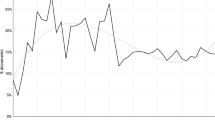Abstract
The moral heart of normative law and economics is efficiency, especially dynamic efficiency that takes incentive effects into account. In the economic theory, justificatory argument is inherently at the institutional- or rule-level, not an the individual- or case-level. InMarkets, Morals, and the Law Jules Coleman argues against the efficiency theory on normative grounds. Although he strongly asserts the need to view law institutionally, he frequently grounds his criticisms of law and economics in arguments from little more than direct moral intuition about individual cases. He evidently holds that consent provides a better normative basis for law than does efficiency and he uses consent arguments to attack recommendations from scholars in law and economics. His own chief contribution, however, is to law and economics rather than to any alternative theory.
Similar content being viewed by others
Rights and permissions
About this article
Cite this article
Hardin, R. The morality of law and economics. Law Philos 11, 331–384 (1992). https://doi.org/10.1007/BF01003982
Issue Date:
DOI: https://doi.org/10.1007/BF01003982




